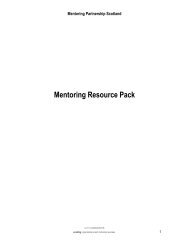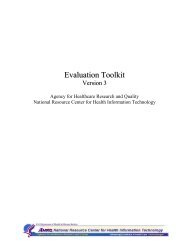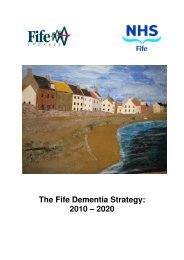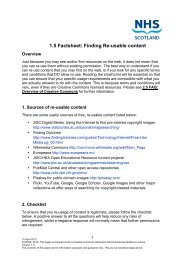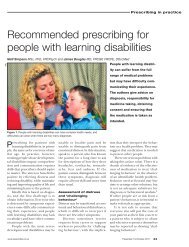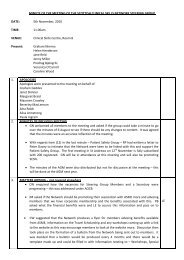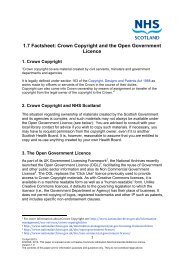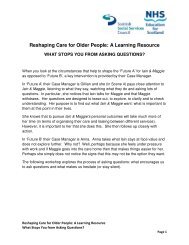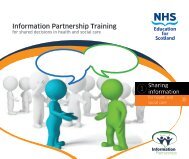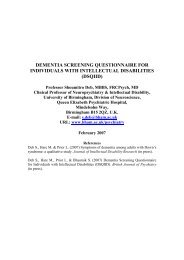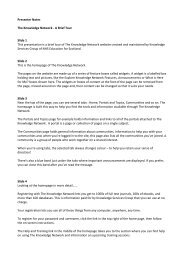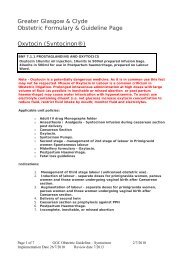Sharing Board Content in Social Media sites - The Knowledge ...
Sharing Board Content in Social Media sites - The Knowledge ...
Sharing Board Content in Social Media sites - The Knowledge ...
You also want an ePaper? Increase the reach of your titles
YUMPU automatically turns print PDFs into web optimized ePapers that Google loves.
2.8 FAQs: <strong>Shar<strong>in</strong>g</strong> <strong>Board</strong> <strong>Content</strong> <strong>in</strong> <strong>Social</strong> <strong>Media</strong> <strong>sites</strong><br />
1. What is social media?<br />
<strong>Social</strong> media offers a fundamental shift <strong>in</strong> the way people communicate. It consists of<br />
a number of onl<strong>in</strong>e tools and platforms where people share their perspectives,<br />
op<strong>in</strong>ions, thoughts and experiences. As such, the user is not only a user of the<br />
application but also a participant by:<br />
• Podcast<strong>in</strong>g<br />
• Blogg<strong>in</strong>g<br />
• Tagg<strong>in</strong>g<br />
• Contribut<strong>in</strong>g to RSS<br />
• <strong>Social</strong> bookmark<strong>in</strong>g<br />
• <strong>Social</strong> network<strong>in</strong>g<br />
<strong>The</strong>re are many def<strong>in</strong>itions and descriptions of social media, but the text provided by<br />
Wikipedia and adapted below provides an overview:<br />
<strong>Social</strong> media refers to the means of <strong>in</strong>teractions among people <strong>in</strong> which they create,<br />
share, and exchange <strong>in</strong>formation and ideas <strong>in</strong> virtual communities and networks. It<br />
has been def<strong>in</strong>ed as "a group of Internet-based applications that build on Web 2.0<br />
and that allow the creation and exchange of user-generated content.” <strong>Social</strong> media<br />
depend on mobile and web-based technologies to create highly <strong>in</strong>teractive platforms<br />
through which <strong>in</strong>dividuals and communities share, co-create, discuss, and modify<br />
user-generated content. It <strong>in</strong>troduces substantial and pervasive changes to<br />
communication between organisations, communities and <strong>in</strong>dividuals.<br />
<strong>Social</strong> media differentiates from traditional media <strong>in</strong> aspects such as quality, reach,<br />
frequency, usability, immediacy and permanence.<br />
2. What is Web 2.0?<br />
As noted, social media rely on Web 2.0 technology. Characteristics of Web 2.0 are:<br />
rich user experience, user participation, dynamic content, metadata, web standards<br />
and scalability. Further characteristics, such as openness, freedom and collective<br />
<strong>in</strong>telligence, also known as “the wisdom of the crowds” by way of user participation,<br />
can also be viewed as essential attributes of Web 2.0.<br />
1 <br />
15 April 2013<br />
© NHSS, 2013. This paper is licensed under a Creative Commons Attribution-NonCommercial-NoDerivs Licence.<br />
Version 1.0<br />
<strong>The</strong> contents of this paper are for <strong>in</strong>formation purposes and guidance only. <strong>The</strong>y do not constitute legal advice
Web 2.0 web<strong>sites</strong> <strong>in</strong>clude the follow<strong>in</strong>g features and techniques:<br />
Search<br />
F<strong>in</strong>d<strong>in</strong>g <strong>in</strong>formation through keyword search.<br />
L<strong>in</strong>ks<br />
Connects <strong>in</strong>formation together <strong>in</strong>to a mean<strong>in</strong>gful <strong>in</strong>formation ecosystem us<strong>in</strong>g the<br />
model of the Web, and provides low-barrier social tools.<br />
Author<strong>in</strong>g<br />
<strong>The</strong> ability to create and update content leads to the collaborative work of many<br />
rather than just a few web authors. In wikis, users may extend, undo and redo each<br />
other's work. In blogs, posts and the comments of <strong>in</strong>dividuals build up over time.<br />
Tags<br />
Categorisation of content by users add<strong>in</strong>g "tags"—short, usually one-word<br />
descriptions—to facilitate search<strong>in</strong>g, without dependence on pre-made categories.<br />
Collections of tags created by many users with<strong>in</strong> a s<strong>in</strong>gle system are referred to as<br />
folksonomies.<br />
Extensions<br />
This refers to softwares that make the Web an application platform as well as a<br />
document server. <strong>The</strong>se <strong>in</strong>clude software like Adobe Reader, Adobe Flash player,<br />
Microsoft Silverlight, ActiveX, Oracle Java, Quicktime, W<strong>in</strong>dows <strong>Media</strong>, etc.<br />
Signals<br />
This refers to the use of syndication technology such as RSS to notify users of<br />
content changes.<br />
3. Why is the use of social media potentially problematic?<br />
Much of the criticism of social media is about the generosity of the licence granted to<br />
the social media site, mean<strong>in</strong>g that anyone post<strong>in</strong>g material to such a site has little or<br />
no control of what gets done with that material. <strong>The</strong>re are also major issues with<br />
trustworth<strong>in</strong>ess and reliability of <strong>in</strong>formation presented, there is concentration of<br />
ownership of social media content <strong>in</strong> the hands of a few organisations, some social<br />
media services pose significant privacy issues, and there are issues relat<strong>in</strong>g to the<br />
<strong>in</strong>teractions created by social media, such as cyber-bully<strong>in</strong>g. Another substantive<br />
area of concern is the possibility that NHSScotland (NHSS) might be brought <strong>in</strong>to<br />
disrepute because of comments made by its staff on social media <strong>sites</strong>. For this<br />
reason, <strong>Board</strong>s, together with many other organisations, are understandably cautious<br />
about allow<strong>in</strong>g staff to access social media <strong>sites</strong> dur<strong>in</strong>g work hours, let alone post<br />
<strong>Board</strong>-created materials to social media <strong>sites</strong>.<br />
2 <br />
15 April 2013<br />
© NHSS, 2013. This paper is licensed under a Creative Commons Attribution-NonCommercial-NoDerivs Licence.<br />
Version 1.0<br />
<strong>The</strong> contents of this paper are for <strong>in</strong>formation purposes and guidance only. <strong>The</strong>y do not constitute legal advice
4. What are the benefits of the use of social media?<br />
Nonetheless, social media offer an opportunity for NHSS to engage with funders, as<br />
well as staff and consumers of its services. A grow<strong>in</strong>g number of marketers are us<strong>in</strong>g<br />
these tools to collaborate with consumers on service development. Among other<br />
th<strong>in</strong>gs, company employees have created wikis—Web <strong>sites</strong> that allow users to add,<br />
delete and edit content—to list answers to frequently asked questions about each<br />
product, and consumers have added significant contributions.<br />
5. What are the legal issues associated with social media?<br />
1. <strong>Social</strong> media are <strong>in</strong>ternational. <strong>The</strong> materials result<strong>in</strong>g from the application<br />
tend to get distributed all over the world.<br />
2. Anyone can contribute – and some might be either ignorant of, or<br />
contemptuous of, established laws, such as copyright and privacy laws, and<br />
so the chances of someth<strong>in</strong>g illegal be<strong>in</strong>g dissem<strong>in</strong>ated and then re-used <strong>in</strong><br />
ignorance by other users of the social media platform are that much higher<br />
than with other, more controlled media.<br />
3. <strong>The</strong> l<strong>in</strong>es of responsibility are blurred – whereas <strong>in</strong> the past, it was clear who<br />
was responsible for creat<strong>in</strong>g and dissem<strong>in</strong>at<strong>in</strong>g particular data or <strong>in</strong>formation,<br />
that dist<strong>in</strong>ction is less clear. Furthermore, <strong>in</strong> many cases, what is posted is<br />
the product of collaboration between several contributors, and it might be<br />
difficult or impossible to tease out who was responsible for what bit.<br />
4. Those who contribute may well be putt<strong>in</strong>g their own jobs or careers at risk by<br />
post<strong>in</strong>g material that br<strong>in</strong>gs their employer or themselves <strong>in</strong>to disrepute.<br />
<strong>The</strong>re are issues to do with contract formation, stalk<strong>in</strong>g and harassment,<br />
gambl<strong>in</strong>g, advertis<strong>in</strong>g, VAT, liability and other legal problems, which can arise<br />
and which the <strong>Board</strong> may never have encountered before.<br />
For all these reasons, if you are plann<strong>in</strong>g to post material relevant to your job, e.g.,<br />
<strong>Board</strong>-owned content or comments about the work of NHSS, on a social media site,<br />
you should check with your l<strong>in</strong>e manager and/or <strong>in</strong>ternal <strong>Board</strong> policy, that it is OK to<br />
do so.<br />
3 <br />
15 April 2013<br />
© NHSS, 2013. This paper is licensed under a Creative Commons Attribution-NonCommercial-NoDerivs Licence.<br />
Version 1.0<br />
<strong>The</strong> contents of this paper are for <strong>in</strong>formation purposes and guidance only. <strong>The</strong>y do not constitute legal advice



